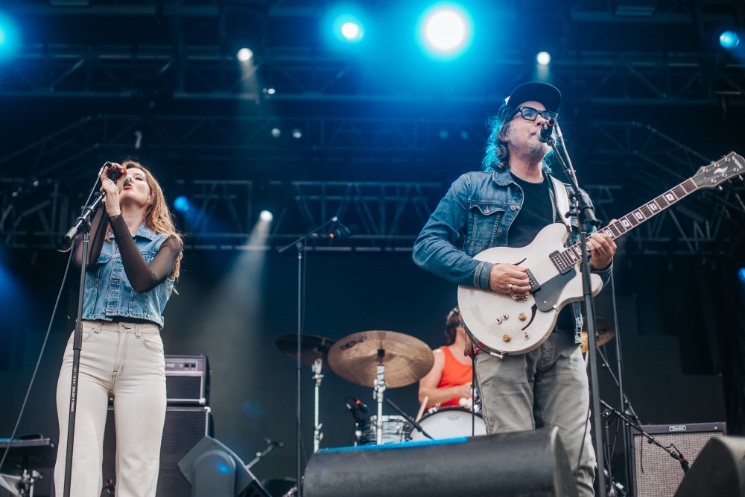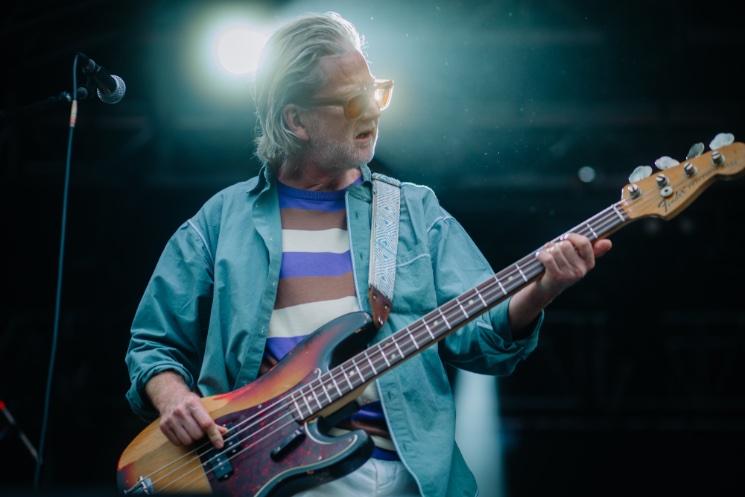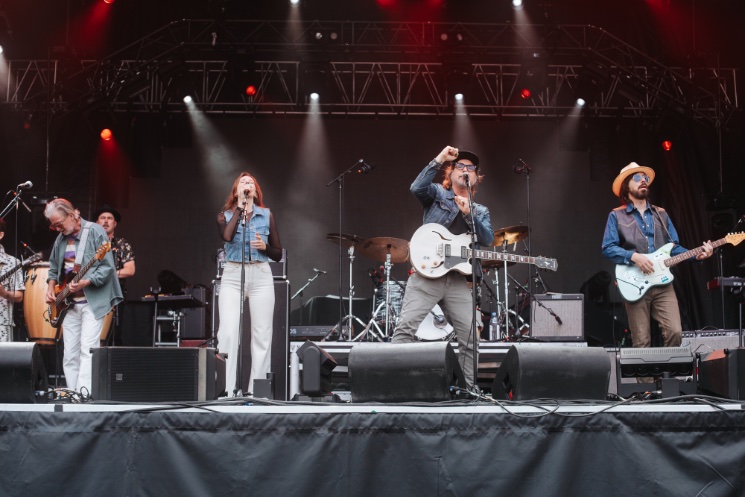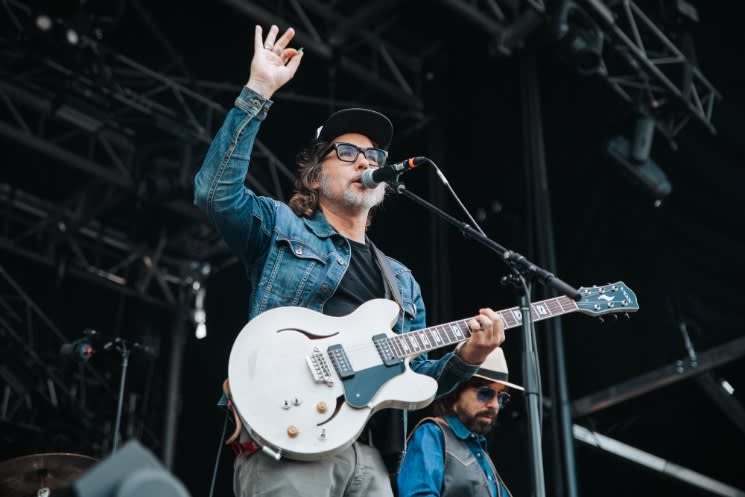Smoke had descended on the grounds for day seven of the Calgary Stampede, and the poor air quality had whipped the festival's normally raucous crowd into an even more chaotic frenzy. As I held my camera above my head and squeezed through the tight crowd of the Midway in a now-familiar routine, it felt like the shortage of breathable air had heightened tension at the festival. Kids bolted past me, tripping as they played tag at my feet, and grown men dressed in cowboy cosplay wandered aimlessly, struggling to balance corn dogs, onion rings and a large coke in one hand. A boyfriend inhaled cotton candy as his partner sobbed uncontrollably next to him, the brim of her cowboy hat masking a face stained with tears.
And then, there was Broken Social Scene. Like a beacon of light in the sea of chaos, the Coca-Cola stage played host to the Canadian alt-rock darlings and their prismatic arrangement of instruments, bandmates, baubles and patterned clothing. Somewhere in the bedlam, Broken Social Scene were a source of familiar calm for the small but dedicated crowd of millennials who planted themselves down in front of the gate barrier, securing their spot at that night's emo/alt-rock lineup, which would later bring Manchester Orchestra and the beloved Jimmy Eat World to the stage.

But first, Broken Social Scene were here to warm things up and prepare the crowd to reminisce in early aughts nostalgia. The only problem? Not everyone had made it here yet.
The production crew tuned and tested the assemblage of on-stage instruments as the crowd trickled in and engaged in idle chatter. A trombone tooted into a mic and a series of guitars were tweaked, one after the other. Just when everyone started wondering what was going on, founders Kevin Drew and Brendan Canning sauntered on stage. Stepping forward to the mic, Drew raised his hand in thanks amidst cheers from the now mid-sized crowd.
"Hey, uh… we're just gonna launch into this thing with no soundcheck," he said, cuing the band up for the opening strings of "Cause = Time". The crowd bobbed along with their best indie-rock show wobble, hands dutifully stuffed into the front pocket of jeans. After the song's instrument-heavy climax, Drew approached the mic again to address the crowd. Although seemingly overwhelmed, he still had a joke or two left in him.
"I wasn't here for rehearsal because I still support Air Canada," he said, to scattered laughs. He smiled and adjusted his black wayfarer glasses, looking the part of a 2000s-era Canadian hipster. "You know, that whole thing… anyway, here's a song about capitalism."
While somewhat of an unexpected start, it was also a moment that perfectly encapsulated the disparate ennui of Broken Social Scene. BSS has always drifted somewhere between a band and a collective, an ever-changing arrangement of coming-and-going indie talent that punctuated the early 2000s rise of alt-rock in Toronto's vibrant scene. The city's counterpart to other instrument-heavy arrangements like Vancouver's New Pornographers and Montréal's Arcade Fire, Broken Social Scene rose to indie-rock royalty status in Canada and beyond with the release of You Forgot It in People.
It's been over 20 years since the record's release and the famous Pitchfork review that shot Broken Social Scene into the indie limelight, but it's clear that the record still resonates with fans in 2023. As the band launched into "Stars and Sons," audience members familiar with the track kept pace with the song's mid-point metronomic claps, filling in the musical elements that the band members themselves had left out.

Flight delays aside, Drew seemed surprised by the number of fans in the crowd, and that they'd had made their way to this particular show to see him play. But that in and of itself speaks to the enduring nature of the band and their cache, which has always seemed somewhat hodgepodge and effortless. After settling in with "7/4 (Shoreline)" from 2005's self-titled record, someone in the front row found their moment to request the fan-favourite "Sweetest Kill."
Drew smiled, finally coming to the realization that the crowd was there to back them up despite any time constraints or hiccups. "Somebody said 'Sweetest Kill' right there…" he mused, then chuckled. "It wasn't on the set."
Another quintessential BSS moment — not including the band's second most-streamed song in their lineup and opting instead for other art-house experiments. Always masters of the impromptu, Drew and his eight-piece collection of bandmates rose to the challenge.
"You don't know the lyrics? Great…" Drew mumbled absently, issuing a round of laughs from the crowd as he turned his back to them and taught the song's structure to those not familiar. They picked it up instantly, and Drew swapped his guitar for a handheld mic to launch into the song's breathy, stripped back vocals.
There were plenty of moments like these, where the crowd's enthusiasm matched the band's desire for connection. It was the glue that held things together, and as Drew relaxed and leaned into the performance, it conveyed the kind of messy honesty that fans have come to know and love about Broken Social Scene. In a fast-paced world dominated by phones, digital streams, viral videos and musical stars that rise and fall to the beat of fickle fame, Broken Social Scene still manage to come together and beat a different drum: one that is inherently anti-capitalist, anti-marketing, anti-cell phone, and which focuses on the power of connection — or simply, the beauty in the act of creating with artists from all backgrounds and lived experiences.

Inherent to Broken Social Scene's lyricism and instrumentation is a thread of truth that keeps the creative potpourri from sounding like a jam session. As the band prepared to round out the set with the airy "Anthems for a Seventeen Year‐Old Girl," Drew reiterated who they were really there for: the fans.
"We don't care about sound check, we care about you," he said to full-bellied cheers from the crowd. "We might have a record coming, but who really knows these days?"
Vocalist Jill Harris filled in for the liquid alto of Emily Haines with the song's recognizable mantra, "Park that car / Drop that phone / Sleep on the floor / Dream about me." Talk to any BSS fan, and they'll have a poignant memory to share about what they were doing, who they were with, and how old they were when they first heard that song. Even here at the Stampede — as the call for a return to simpler times free from the burden and artistic constraints of the digital streaming era, missed flight connections and a changed Canadian music industry melted away — the words rang true.
And then, there was Broken Social Scene. Like a beacon of light in the sea of chaos, the Coca-Cola stage played host to the Canadian alt-rock darlings and their prismatic arrangement of instruments, bandmates, baubles and patterned clothing. Somewhere in the bedlam, Broken Social Scene were a source of familiar calm for the small but dedicated crowd of millennials who planted themselves down in front of the gate barrier, securing their spot at that night's emo/alt-rock lineup, which would later bring Manchester Orchestra and the beloved Jimmy Eat World to the stage.

But first, Broken Social Scene were here to warm things up and prepare the crowd to reminisce in early aughts nostalgia. The only problem? Not everyone had made it here yet.
The production crew tuned and tested the assemblage of on-stage instruments as the crowd trickled in and engaged in idle chatter. A trombone tooted into a mic and a series of guitars were tweaked, one after the other. Just when everyone started wondering what was going on, founders Kevin Drew and Brendan Canning sauntered on stage. Stepping forward to the mic, Drew raised his hand in thanks amidst cheers from the now mid-sized crowd.
"Hey, uh… we're just gonna launch into this thing with no soundcheck," he said, cuing the band up for the opening strings of "Cause = Time". The crowd bobbed along with their best indie-rock show wobble, hands dutifully stuffed into the front pocket of jeans. After the song's instrument-heavy climax, Drew approached the mic again to address the crowd. Although seemingly overwhelmed, he still had a joke or two left in him.
"I wasn't here for rehearsal because I still support Air Canada," he said, to scattered laughs. He smiled and adjusted his black wayfarer glasses, looking the part of a 2000s-era Canadian hipster. "You know, that whole thing… anyway, here's a song about capitalism."
While somewhat of an unexpected start, it was also a moment that perfectly encapsulated the disparate ennui of Broken Social Scene. BSS has always drifted somewhere between a band and a collective, an ever-changing arrangement of coming-and-going indie talent that punctuated the early 2000s rise of alt-rock in Toronto's vibrant scene. The city's counterpart to other instrument-heavy arrangements like Vancouver's New Pornographers and Montréal's Arcade Fire, Broken Social Scene rose to indie-rock royalty status in Canada and beyond with the release of You Forgot It in People.
It's been over 20 years since the record's release and the famous Pitchfork review that shot Broken Social Scene into the indie limelight, but it's clear that the record still resonates with fans in 2023. As the band launched into "Stars and Sons," audience members familiar with the track kept pace with the song's mid-point metronomic claps, filling in the musical elements that the band members themselves had left out.

Flight delays aside, Drew seemed surprised by the number of fans in the crowd, and that they'd had made their way to this particular show to see him play. But that in and of itself speaks to the enduring nature of the band and their cache, which has always seemed somewhat hodgepodge and effortless. After settling in with "7/4 (Shoreline)" from 2005's self-titled record, someone in the front row found their moment to request the fan-favourite "Sweetest Kill."
Drew smiled, finally coming to the realization that the crowd was there to back them up despite any time constraints or hiccups. "Somebody said 'Sweetest Kill' right there…" he mused, then chuckled. "It wasn't on the set."
Another quintessential BSS moment — not including the band's second most-streamed song in their lineup and opting instead for other art-house experiments. Always masters of the impromptu, Drew and his eight-piece collection of bandmates rose to the challenge.
"You don't know the lyrics? Great…" Drew mumbled absently, issuing a round of laughs from the crowd as he turned his back to them and taught the song's structure to those not familiar. They picked it up instantly, and Drew swapped his guitar for a handheld mic to launch into the song's breathy, stripped back vocals.
There were plenty of moments like these, where the crowd's enthusiasm matched the band's desire for connection. It was the glue that held things together, and as Drew relaxed and leaned into the performance, it conveyed the kind of messy honesty that fans have come to know and love about Broken Social Scene. In a fast-paced world dominated by phones, digital streams, viral videos and musical stars that rise and fall to the beat of fickle fame, Broken Social Scene still manage to come together and beat a different drum: one that is inherently anti-capitalist, anti-marketing, anti-cell phone, and which focuses on the power of connection — or simply, the beauty in the act of creating with artists from all backgrounds and lived experiences.

Inherent to Broken Social Scene's lyricism and instrumentation is a thread of truth that keeps the creative potpourri from sounding like a jam session. As the band prepared to round out the set with the airy "Anthems for a Seventeen Year‐Old Girl," Drew reiterated who they were really there for: the fans.
"We don't care about sound check, we care about you," he said to full-bellied cheers from the crowd. "We might have a record coming, but who really knows these days?"
Vocalist Jill Harris filled in for the liquid alto of Emily Haines with the song's recognizable mantra, "Park that car / Drop that phone / Sleep on the floor / Dream about me." Talk to any BSS fan, and they'll have a poignant memory to share about what they were doing, who they were with, and how old they were when they first heard that song. Even here at the Stampede — as the call for a return to simpler times free from the burden and artistic constraints of the digital streaming era, missed flight connections and a changed Canadian music industry melted away — the words rang true.
